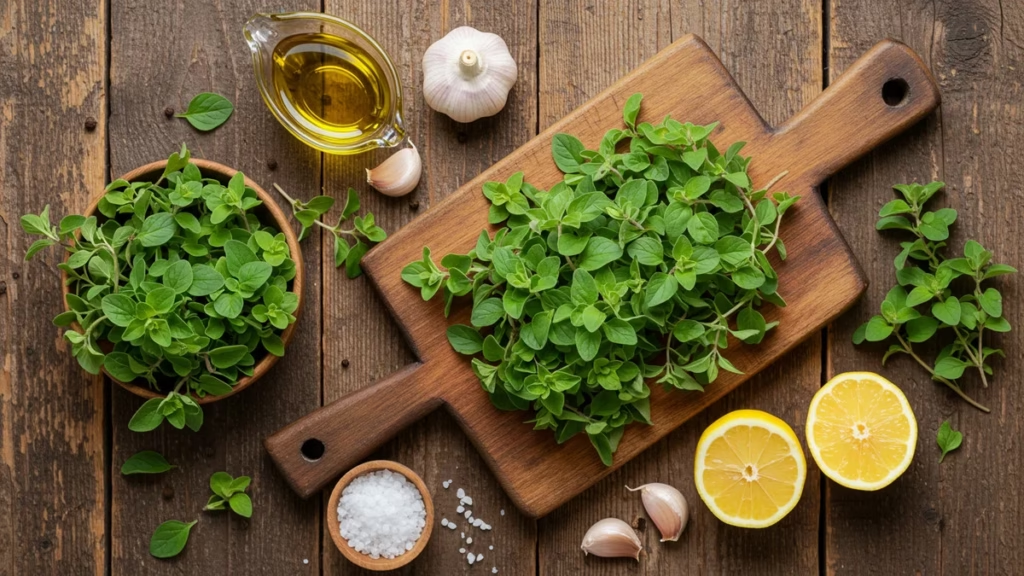Introduction
When you hear the word “oregano,” you probably think of the aromatic herb sprinkled over pizzas or pasta dishes. But fresh oregano is much more than just a culinary ingredient—it’s a powerhouse of nutrients and bioactive compounds that have been used for centuries in traditional medicine. Modern research is now backing up many of its health benefits, from fighting infections to supporting digestion and heart health.
In this blog, we’ll explore everything you need to know about fresh oregano—its nutritional value, health benefits, culinary uses, precautions, and more.
What Is Fresh Oregano?
Oregano (Origanum vulgare) is a perennial herb belonging to the mint family (Lamiaceae). While dried oregano is commonly used as a spice, fresh oregano leaves contain higher levels of antioxidants and essential oils, making them especially beneficial.
- Taste: Fresh oregano has a bold, peppery flavor with a slightly bitter undertone.
- Aroma: Strong, earthy, and slightly sweet.
- Forms available: Fresh leaves, dried leaves, essential oil, tinctures, and supplements.
Nutritional Profile of Fresh Oregano
It is nutrient-dense and low in calories, making it a healthy addition to your meals.
| Nutrient (per 1 tablespoon, fresh) | Amount | % Daily Value (DV) |
|---|---|---|
| Calories | 3 | – |
| Vitamin K | 12 mcg | 15% |
| Vitamin A | 85 IU | 2% |
| Vitamin C | 1 mg | 2% |
| Iron | 0.3 mg | 2% |
| Calcium | 30 mg | 3% |
| Fiber | 0.4 g | – |
Key compounds in oregano:
- Carvacrol – antimicrobial and anti-inflammatory
- Thymol – antifungal and antioxidant
- Rosmarinic acid – anti-inflammatory and supports immunity
Health Benefits of Fresh Oregano
1. Rich in Antioxidants
Fresh oregano contains powerful antioxidants like rosmarinic acid and thymol that fight oxidative stress. These compounds protect cells from free radical damage, reducing the risk of chronic conditions such as heart disease and cancer.
2. Natural Antimicrobial Properties
Research shows that oregano’s active compounds (especially carvacrol and thymol) can inhibit bacteria, viruses, and fungi. Traditionally, oregano has been used to treat coughs, colds, and minor infections.
3. Supports Digestive Health
Fresh oregano stimulates bile flow, improving digestion and nutrient absorption. Its antimicrobial properties also help balance gut bacteria, reducing bloating and indigestion.
4. Boosts Immunity
Vitamin C, vitamin A, and phytonutrients in oregano help strengthen the immune system. Consuming Green oregano tea or adding it to meals can support your body’s natural defense mechanisms.
5. Heart Health Benefits
Oregano compounds may help reduce cholesterol and regulate blood pressure. Its antioxidants also prevent oxidative stress in blood vessels, improving circulation.
6. Anti-Inflammatory Effects
Chronic inflammation is linked to conditions like arthritis and diabetes. The rosmarinic acid in oregano has strong anti-inflammatory effects, which may help reduce symptoms of inflammatory conditions.
7. Bone and Skin Health
- Bone health: Oregano provides calcium, iron, and vitamin K, essential for maintaining bone strength.
- Skin health: Oregano oil (diluted) is used in skincare for its antibacterial and anti-acne benefits.
Culinary Uses of Fresh Oregano
Raw oregano adds both flavor and nutrition to meals. Here are some ways to use it:
- Cooking: Add fresh oregano leaves to soups, sauces, roasted vegetables, and grilled meats.
- Herbal tea: Steep fresh oregano leaves in hot water for a soothing tea.
- Garnish: Sprinkle chopped leaves on salads, pizza, or pasta.
- Infused oil: Combine fresh oregano with olive oil for a flavorful drizzle.
How to Store Fresh Oregano
To maximize freshness:
- Refrigeration: Wrap in a damp paper towel and store in a plastic bag for up to a week.
- Freezing: Chop leaves and freeze in ice cube trays with olive oil.
- Drying: Air-dry bunches in a cool, dry place, then store in airtight jars.
Potential Side Effects and Precautions
While Green oregano is generally safe, excessive consumption or concentrated forms (like essential oil) may cause issues:
- Allergic reactions: Some people allergic to mint-family herbs may react to oregano.
- Blood clotting: High doses may interact with blood-thinning medications due to its vitamin K content.
- Pregnancy: Avoid high medicinal doses during pregnancy without medical supervision.
👉 Always consult a healthcare professional before using oregano as a supplement.
Fresh Oregano vs. Dried Oregano
| Feature | Fresh Oregano | Dried Oregano |
|---|---|---|
| Flavor | Strong, vibrant, earthy | More concentrated, slightly bitter |
| Nutrient levels | Higher vitamin C & oils | Higher in antioxidants per gram |
| Shelf life | Short (1 week) | Long (6–12 months) |
| Best use | Garnishes, teas, fresh dishes | Cooking, sauces, marinades |
How to Grow Fresh Oregano at Home
It is easy to grow in gardens or pots.
- Sunlight: Needs 6–8 hours of sunlight daily.
- Soil: Well-drained, sandy soil works best.
- Watering: Water when the soil feels dry.
- Harvesting: Pick leaves before flowering for maximum flavor.
Growing your own oregano ensures a steady supply of fresh leaves and saves money.
Frequently Asked Questions (FAQs)
1. Is fresh oregano healthier than dried oregano?
Yes. Fresh oregano has higher levels of vitamin C and essential oils, while dried oregano has a more concentrated flavor and antioxidant content per gram.
2. Can I eat fresh oregano raw?
Yes, fresh oregano leaves can be eaten raw in salads, sauces, or as a garnish.
3. How much fresh oregano should I eat daily?
Moderate amounts (1–2 tablespoons) are safe for daily consumption in meals. For medicinal use, consult a healthcare provider.
4. Does oregano tea really work for colds?
Yes, oregano tea made from fresh leaves may help soothe sore throats and coughs due to its antimicrobial and anti-inflammatory properties.
5. Can fresh oregano help with weight loss?
Indirectly, yes. Oregano supports digestion and metabolism, which may aid weight management when combined with a healthy lifestyle.
Conclusion
Fresh oregano is more than just a flavorful herb—it’s a nutrient-rich plant with antimicrobial, antioxidant, and anti-inflammatory benefits. From boosting immunity and heart health to improving digestion, this herb deserves a spot in your kitchen and your wellness routine. Whether you add it to your meals, brew it as tea, or grow it in your garden, Green oregano offers a natural way to support overall health.







